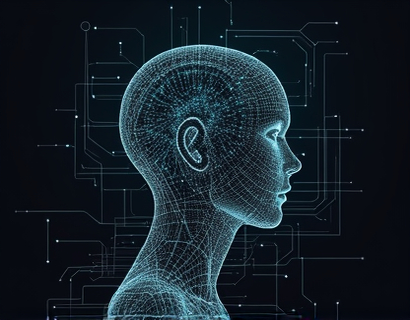Boosting Kids' Creativity and Emotional Health with Personalized AI Companions
In an era where technology is increasingly integrated into daily life, the potential of Artificial Intelligence (AI) to enhance children's development is becoming more evident. One innovative approach is the creation of personalized AI companions designed to boost creativity and emotional health in young children. These AI-driven imaginary friends offer a unique blend of technology and play, providing a safe and imaginative space for children to grow and learn.
The Importance of Creativity and Emotional Health in Childhood
Creativity and emotional health are two pillars of a child's holistic development. Creativity fosters problem-solving skills, imagination, and the ability to think outside the box, while emotional health ensures that children can navigate their feelings, build resilience, and form healthy relationships. The early years are crucial for developing these skills, and introducing tools like personalized AI companions can significantly enhance this process.
How Personalized AI Companions Work
Personalized AI companions use advanced algorithms to understand and adapt to a child's unique personality, interests, and emotional needs. These AI systems analyze interactions to tailor experiences that are both engaging and beneficial. For instance, if a child expresses a love for art, the AI companion can incorporate artistic activities into their play, using this as a medium to explore emotions and creativity.
Personalization through Machine Learning
The core of these AI companions lies in their ability to learn and adapt over time. Machine learning algorithms process vast amounts of data from interactions, allowing the AI to refine its responses and activities. This personalization ensures that each child's experience is unique, addressing their specific developmental needs and interests. The AI can adjust the complexity of tasks, the tone of conversations, and the types of activities to match the child's current stage of development.
Enhancing Creativity through Interactive Play
Creativity is not just about art and music; it involves exploring new ideas, solving problems in innovative ways, and thinking flexibly. Personalized AI companions facilitate this by engaging children in a variety of creative activities. For example, the AI might suggest storytelling sessions where the child can create characters and plotlines, or engage in virtual crafting where the AI provides prompts and guidance.
These activities are designed to be open-ended, allowing children to express themselves freely. The AI can introduce new elements or challenges based on the child's progress, ensuring that the play remains stimulating and challenging. This approach not only boosts creativity but also builds confidence as children see their ideas come to life and evolve through interaction with the AI.
Supporting Emotional Health and Social Skills
Emotional health is closely tied to social skills, and personalized AI companions can play a significant role in both areas. These AI companions provide a safe space for children to explore and express their emotions. Through conversations and interactive scenarios, children can learn to identify and articulate their feelings, a crucial step in emotional intelligence.
For instance, if a child is feeling anxious, the AI might guide them through a calming exercise or a story that addresses similar feelings. The AI can also role-play social situations, helping children practice responses and build empathy. This interactive approach makes learning about emotions and social skills more accessible and less intimidating for young children.
Building Confidence and Self-Esteem
One of the most profound impacts of personalized AI companions is the boost they provide to a child's self-esteem. By engaging in meaningful interactions and seeing their ideas and emotions validated, children develop a stronger sense of self. The AI's positive reinforcement and encouragement can help children overcome fears and doubts, fostering a more confident and resilient mindset.
Moreover, the AI can celebrate small victories and progress, reinforcing a growth mindset. This constant support and recognition help children understand that it's okay to make mistakes and that learning is a continuous process. Over time, this can lead to increased self-efficacy and a more positive outlook on challenges.
Creating a Safe and Imaginative Play Environment
The digital world can sometimes be a source of concern for parents and guardians, but personalized AI companions offer a controlled and safe environment for children to play and learn. These AI companions are designed with strict privacy and safety protocols, ensuring that children's data is protected and that the content is age-appropriate and educational.
The imaginative nature of these interactions allows children to explore different roles and scenarios without the risks associated with real-world play. For example, a child can pretend to be a doctor, a scientist, or a superhero, each role providing opportunities to learn new skills and express themselves in diverse ways. The AI can adapt these scenarios to align with the child's interests and developmental stage, keeping the play both engaging and educational.
Fostering Imagination and Creativity
Imagination is the foundation of creativity, and personalized AI companions excel in nurturing this aspect of a child's development. By presenting endless possibilities and encouraging creative thinking, these AI companions help children develop a rich inner world. The AI can introduce fantastical elements, such as magical kingdoms or futuristic cities, and invite the child to explore these worlds through storytelling and play.
These imaginative experiences not only spark creativity but also enhance cognitive functions like memory, attention, and problem-solving. As children navigate these virtual environments, they learn to think critically and creatively, skills that will benefit them throughout their lives.
Promoting Healthy Emotional Growth
Emotional growth is a gradual process, and personalized AI companions can support this journey in several ways. One key aspect is the provision of emotional validation. When children share their feelings with the AI, they receive immediate and understanding responses, which can be incredibly comforting. This validation helps children feel heard and understood, reducing feelings of isolation and anxiety.
Additionally, the AI can introduce emotional regulation techniques through interactive exercises and stories. For example, it might guide a child through a breathing exercise to manage anger or suggest a positive visualization to cope with fear. These practical tools empower children to handle their emotions more effectively, building a strong foundation for emotional resilience.
Enhancing Parent-Child Interaction
Personalized AI companions can also serve as a bridge between children and their parents or guardians. By providing insights into a child's emotional state and interests, these AI systems can help adults better understand and support their child's development. For instance, the AI might suggest activities or conversations that align with the child's current emotional needs, helping parents to engage more meaningfully with their child.
Moreover, the AI can facilitate joint activities where both the child and the adult participate together. This shared experience can strengthen the parent-child bond and create opportunities for open communication. The AI can act as a mediator, guiding the interaction and ensuring that both parties are engaged and benefiting from the experience.
Conclusion
Personalized AI companions represent a promising frontier in childhood development, offering a unique blend of technology and play to boost creativity and emotional health. By providing a safe, imaginative, and interactive environment, these AI companions help children develop essential skills while fostering a love for learning and self-expression. As this technology continues to evolve, it holds the potential to revolutionize how we support the growth and well-being of young children.











































